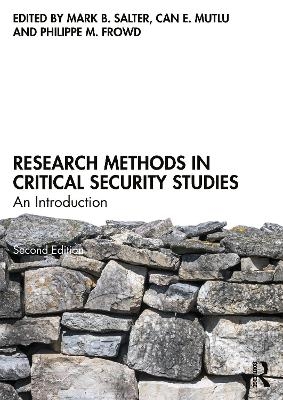
Research Methods in Critical Security Studies
Routledge (Verlag)
978-0-367-62113-1 (ISBN)
This textbook surveys new and emergent methods for doing research in critical security studies, filling a gap in the literature. The second edition has been revised and updated.
This textbook is a practical guide to research design in this increasingly established field. Arguing for serious attention to questions of research design and method, the book develops accessible scholarly overviews of key methods used across critical security studies, such as ethnography, discourse analysis, materiality, and corporeal methods. It draws on prominent examples of each method’s objects of analysis, relevant data, and forms of data collection. The book’s defining feature is the collection of diverse accounts of research design from scholars working within each method, each of which is a clear and honest recounting of a specific project’s design and development. This second edition is extensively revised and expanded. Its 33 contributors reflect the sheer diversity of critical security studies today, representing various career stages, scholarly interests, and identities. This book is systematic in its approach to research design but keeps a reflexive and pluralist approach to the question of methods and how they can be used. The second edition has a new forward-looking conclusion examining future research trends and challenges for the field.
This book will be essential reading for upper-level students and researchers in the field of critical security studies, and of much interest to students in International Relations and across the social sciences.
Mark B. Salter is Professor in the School of Political Studies, University of Ottawa, Canada. He is the author/editor of eight books, including Making Things International 1 and 2 (2015 and 2016). He is also Editor-in-Chief of the journal Security Dialogue. Can E. Mutlu is Associate Professor of Global Politics at Acadia University in Wolfville, NS, Canada. His research interests include borders, migration, technology, and security. He is the co-editor of Architectures of Security: Design, Control, Mobility (with Benjamin J. Muller). Philippe M. Frowd is Associate Professor in the School of Political Studies at the University of Ottawa, Canada. His research focuses on the governance of irregular migration and border control in the Sahel region of West Africa. He is the author of Security at the Borders (2018).
1. Introduction PART I: RESEARCH DESIGN 2. Research Design 3. Wondering as Research Attitude 4. Do You Have What It Takes? Accounting for Emotional and Material Capacities 5. Attuning to 'Mess': Not Presuming to Know Sanctuary 6. Engaging Collaborative Writing Critically 7. Accessing the ‘Field' of Terrorism Studies PART II: ETHNOGRAPHY 8. Ethnography 9. Travelling with Ethnography 10. Reflexive Inquiry 11. Listening to Migrant Stories: Considerations on Voice 12. Learning by Feeling: Emotional Intelligence and Fieldwork 13. Doing Sensitive Research: Fieldwork Ethics and Methodologies 14. 'China is the Safest Country in the World!’: Translation, Travel, and the Problem of Fit’ 15. Methods that Mirror Migration: Ethics and Entanglement En Route 16. Researching Security Decisions at the Border (or Serendipity and Secret Places) 17. ‘Dangerous' Fieldwork PART III: PRACTICES 18. Practices 19. The Practice of Writing 20. Researching Anti-Deportation: Socialization as Method 21. Expertise in the Aviation Security Field 22. Mapping Urban Security Practices 23. Following Turkish Border Practices PART IV: DISCOURSE 24. Discourse 25. Archives 26. Legislative Practices 27. Problems, Tools, and Creativity: A Pragmatist Approach to Emotion and Security 28. Keeping Secrets: Freedom of Information Requests and Critical Security Studies 29. Understanding Discourses of Arctic In/Security PART V: CORPOREAL 30. The Corporeal 31. Theorizing the Body in IR 32. Reading the Maternal Body as Political Event 33. Sonic Encounters in Critical Security Studies: Reflections from Ethnographic Fieldwork in Morocco 34. Thinking Like a Microbe PART VI: MATERIALITY 35. Materiality 36. Infrastructure 37. The F-35 38. Complicating Risk, Home and the Field: Security Research in Spaces of Control 39. Unlearning Research Methods: Stories of Attunement and Failure 40. Security Technologies and Criticality 41. Materiality and the Production of Objects PART VII: CONCLUSION 42. Emerging Trends
| Erscheinungsdatum | 29.04.2023 |
|---|---|
| Zusatzinfo | 12 Tables, black and white |
| Verlagsort | London |
| Sprache | englisch |
| Maße | 174 x 246 mm |
| Gewicht | 760 g |
| Themenwelt | Sozialwissenschaften ► Politik / Verwaltung ► Europäische / Internationale Politik |
| ISBN-10 | 0-367-62113-4 / 0367621134 |
| ISBN-13 | 978-0-367-62113-1 / 9780367621131 |
| Zustand | Neuware |
| Haben Sie eine Frage zum Produkt? |
aus dem Bereich


